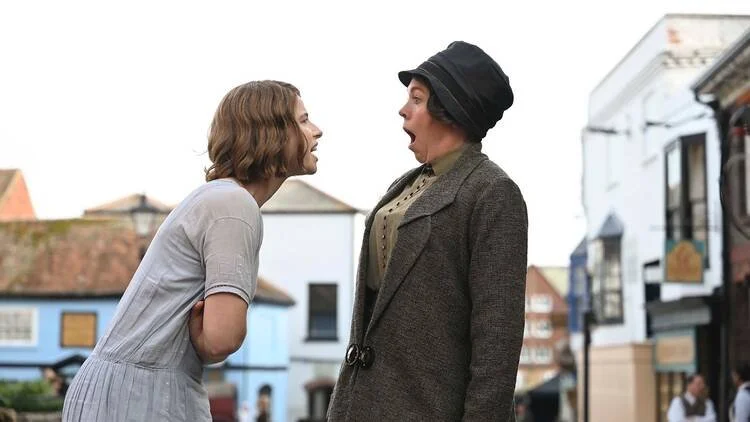WICKED LITTLE LETTERS
Directing: B-
Acting: B+
Writing: B-
Cinematography: B
Editing: B
Well, I’m going to stay on brand and go right to the race discussion—or rather, the odd point of view that Wicked Little Letters seems to have that there is no need to have one. One might try to argue that this film’s director (Thea Sharrock) and its producers had their heart in the right place, casting key characters in 1920s Littlehampton, England with actors of color, but I would counter that this was wildly misguided. Not so much because it gives dipshit conservatives ammunition in their stupid arguments against “color blind casting,” but because race is never even acknowledged in the film, thereby creating the sense that, while sexism plays a significant part in this story, somehow this was some kind of racial utopia, where skin color meant nothing to anyone. This is tantamount to revisionist history.
And what’s the point of that? This is no reflection on the actors, who are lovely—particularly Anjana Vasan as “Woman Police Officer Gladys Moss,” and Malachi Kirby as Bill, boyfriend to Rose (Jessie Buckley), the woman accused of sending profane letters to people all over the town, but particularly to her self-righteous neighbor, Edith (Olivia Colman). I mean, I’m genuinely glad these actors of color are getting work. I just wish they would get offered roles that made more sense: it isn’t hard to find out that, in the real life story on which this film is based, both of these people were actually White. Because in all likelihood, in 1920s small-town England, such people would be.
This deliberate choice to ignore race in a story steeped in sexism and misogyny is always irritating. It’s the exact same problem that existed in the Hulu adaptation of The Handmaid’s Tale, which ignored race in a dystopian near-future. In what universe would this ever be the case? Willful ignorance of intersectionality only serves to further White feminism, which serves no one.
So, that is the major flaw in Wicked Little Letters, and it is a pretty glaring, consistently distracting one—if you approach a movie like this with critical thinking, anyway. This is a small movie that carries no such expectation, but I hesitate to regard that as a good excuse.
All that aside—and admittedly, for me it’s a pretty big aside—Wicked Little Letters is a genuinely charming watch, with solid performances, particularly among its two leads, Olivia Colman and Jessie Buckley. both of who already have well established track records as stellar performers. In this case, Colman’s Edith is a middle-aged, never-married woman living a deeply repressed life with her parents and particularly under the thumb of her oppressive father, Edward (Timothy Spall). Buckley’s Rose is the free-spirited, foul-mouthed young mother and widow who moves in next door.
The film opens with what is identified as the “19th letter,” addressed to Edith and read by her parents, all of them sitting at their dining table. They are all convinced, with no more evidence than her general demeanor, that Rose sent it. Soon enough, Edith is giving an official statement to the police, and that is how we get half-truths from Edith about some backstory, where these two women actually spend some time as friends, but then fell out after Rose head-butt a man at Edward’s birthday party. I could have used a little more about how the two women got from there to here, as this backstory gets a bit glossed over, robbing them both of some character dimension.
Wicked Little Letters starts with a title card reading, This is more true than you’d think. Mmm, after seeing how it was cast, maybe not. The “mystery” of who is actually writing the letters becomes clear rather early on, henceforth focusing on where Edith and Rose go from there. For what they are, they do both make compelling characters, a great deal of which can be credited to the actors. I did enjoy the extensive amount of time spent on long strings of increasingly creative profanity. Even the end credits are seen over script appearing on letter papers, with phrases like “ten cocks a week minimum.” So that’s fun.
This is a movie that could have been a lot better with the right guidance, but some of its production choices are baffling. I can’t even fault the writer (Jonny Sweet), as his script makes no reference to ethnicity whatsoever—because why would it? In the end, it’s a charming story that did not aim for fantasy but kind of landed there.
These bitches
Overall: B

